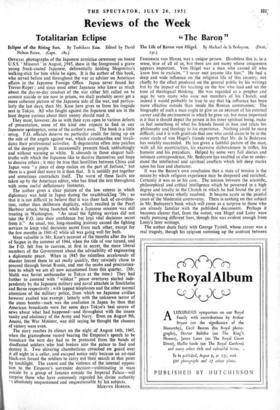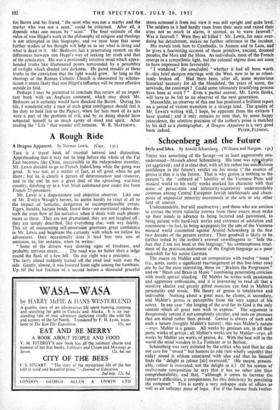g4 The Baron"
.
FRIEDRICH VON HUGEL was a unique person. Doubtless this is, in a sense, true of all of us, but there are not many whose uniqueness appears important. Von Htigel was a man who caused all who knew him to exclaim, " I never met anyone like him." He had a deep and wide influence on the religious life of this country, not chiefly by the effect produced on the general public by his writings but by the impact of his teaching on the few who lead and set the tone of theological thinking. He was regarded as a prophet and sage by very many who were not members of his Church, and indeed it would probably be true to say that hic influence has been more effective outside than inside the Roman communion. The biography of such a man ought to give us an account of his external career and the environment in which he grew up, but more important is it that it should depict the person in his inner spiritual being, make us feel something of what his friends found in him and relate his philosophy and theology to his experience. Nothing could be more difficult, and it is with gratitude that one who could claim to be in the outer circle of von Hiigel's friends reports that Mr. de la Bedoyere has notably succeeded. He has given a faithful picture of the man, with all his eccentricities, his excessive elaborateness in trifles, his humor and his prejudices. Helped by some very full diaries and intimate correspondence, Mr. Bedoyere has enabled us also to under- stand the intellectual and spiritual conflicts which left deep marks upon his face and character.
It was the Baron's own conclusion that a state of tension is the means by which religious experience may be deepened and enriched. Certainly it was so in his case. The tension between the scientific, philosophical and critical intelligence which he possessed in a high degree and loyalty to the Church in which he had found the joy of worship was never wholly resolved. It became acute in the painful years of the Modernist controversy. There is nothing on this subject in Mr. Bedoyere's book which will come as a surprise to those who are already familiar with the published documents. Perhaps it becomes clearer that, from the outset, von Hugel and Loisy were really pursuing different lines, though this was evident enough from Loisy's later writings.
The author deals fairly with George Tyrrell, whose career was a real tragedy, though his epigram summing up the contrast between
the Baron and his friend, " the saint who was not a martyr and the martyr who was not a saint," could be criticised. • After all, it depends what one means by " saint." The final estimate of the value of von Htigel's work in the philosophy-of religion and theology is not attempted in this biography, and we must hope that some further studies of his thought will help us to see what is living and what is dead in it. Mr. Bedoyere has a penetrating remark on the differences between von Hugel's way of seeking for truth and that of the scholastics. His was a profoundly intuitive mind which appre- hended truths like illuminated points surrounded by a penumbra of twilight which shaded into darkness. He gazed steadily at these truths in the conviction that the light would grow. So long as the theology of the. Roman Catholic Church is dominated by scholas- ticism it seems likely that von Htigel's influence will be more effective outside its fold.
Perhaps I may be permitted to conclude this review of an impor- tant book with an Anglican comment, which may shock Mr. Bedoyere as it certainly would have shocked the Baron. During his life, I wondered why a man of such great intelligence should feel it his duty to hold fast, to the Papacy, when for him most of its acts were a part of the problem of evil, and by so doing should have subjected himself to so much agony of mind and spirit. After reading the " Life " that wonder still remains. W. R. MATTHEWS.



































 Previous page
Previous page